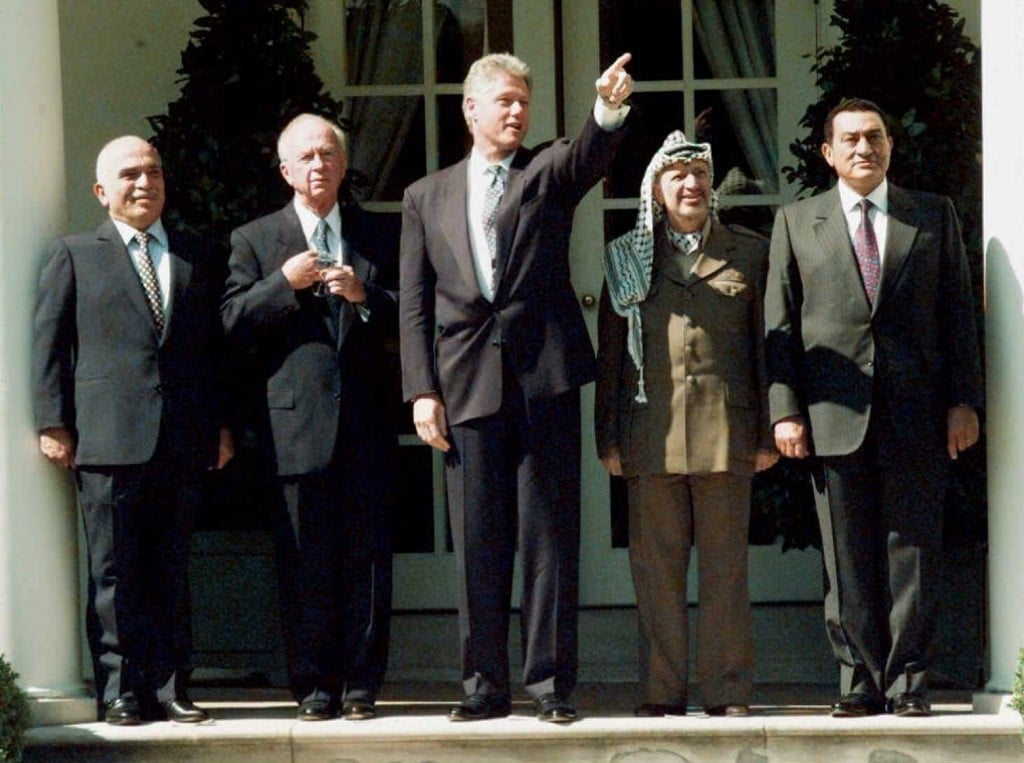
Majed Kayali
When the sixth Palestinian National Council was held in Cairo 1969, the Palestinian National Movement set certain targets to be achieved in their struggle against Israel. The targets included “returning the Palestinian people to their homeland”, and “establishing a democratic Palestinian State on the whole land of Palestine”. That meant building a state that is “free of all forms of religious and social discrimination”. By that, the attendants showed that the struggle is not an ethnic or sectarian one against Jews. Thus, the desired state is a one that “guarantees equal rights and duties for whoever lives in it peacefully”.
27 years ago, Oslo Accords were signed. Since then, the aim to establish an independent Palestinian state has been confronted – for different reasons – with many obstacles. That leads us to recovering the one democratic state solution in all its forms. Contrary to what some might think, such an approach should not be treated as an alternative or an exclusive solution. Rather, it is an option that should be followed in parallel, considering that such a solution is the ideal for both Palestinians and Israelis.
First, many people believe that this solution is compatible with the values of citizenship in liberal democratic systems in the world. Moreover, a one-state solution is compatible with human values and development cycle of political systems. Nevertheless, going forward with this solution requires having suitable circumstances. Second, this solution – more than any other one – represents an answer to the questions posed by Palestinians all over the world (in 1948 regions; the West Bank and Gaza; and countries of asylum and diaspora). These questions deal with issues like equality, the right to return and getting rid of occupation and settlement. On the other hand, the one-state solution gives answers to the “Jewish question” in Palestine, as it leads to forming new developments in the Palestinian and Israeli societies. Options include a state where all citizens are equal in a democratic system, a bi-national democratic state, or even a federal state. Based on that, Palestinians have to be freed from everything related to occupation, racism and Israeli dominance. In turn, Israeli Jews have to be free themselves from Zionism.
Values of truth, justice, freedom, equality and democracy should be included in the idea of liberation when approaching the Palestinian-Israeli conflict. That should be achieved in a context that guarantees justice, even if such a justice will be partial.
This transformation firstly supposes widening the Palestinian options rather than closing the door on the face of potential or latent future developments. Secondly, it supposes not being restricted to one option in any stage or under any circumstance. A good example to avoid is what we have done by sticking for 46 years to the independent state option. Thirdly, all options generated in the future should be connected to the one democratic state option. Such a solution is ideal as it guarantees the unity of the Palestinian people and land, while providing a solution for the “Israeli question”.
With all changes seen by Palestinians, Israelis and in the Arab region, it is difficult to have realistic Palestinian options that solve all challenges. However, sticking to one solution for decades is not a possibility. We should not refrain from imaging any scenarios of a possible transformation that will render the existence of a colonial, settler and racist state in the 21st century. Such a transformation will be good for all related parties. Furthermore, it will be a step to secure peace and global stabilization, especially in the Middle East.
In a struggle that lasted for more than half a century, Palestinians were confronted with many failures regarding their national aspirations. There was also a big gap in power balance. A big shift also occurred in the Arab and the international circumstances. Nevertheless, Palestinians looks nowadays for a more effective, collective and alternative national vision that enhances their resilience in their homeland. They seek options that strengthen their resilience against the Israeli attempts to escape from Oslo Accords. Israel works meanwhile on increasing settlement, in addition to Judaizing Jerusalem and building the separation wall. Furthermore, Israel works on building bypass roads, sieging Gaza, staling negotiation process and blocking any potential of establishing a Palestinian independent state.
In other words, there is currently no fair solution for Palestinians. At the same time, history can’t run backward. It is obviously impossible to erase a group of humans, neither from an ethical perspective nor from a practical approach.
Regardless of emotions and slogans, the Palestinian people is a weakened and a torn one. It is evident that Palestinians are in a dire need to formulate a comprehensive national vision. Such a vision has to take into consideration that thoughts about land, people and cause should complement each other. That vision has also to focus on rights, humanity and society development. On the other hand, Israel has to free herself from colonial, racist and settler characteristics. Such a national vision has to have the right balance between reality, ambitions, capabilities and slogans.
DISCLAIMER
The opinions expressed in this publication are those of our bloggers. They do not purport to reflect the opinions or views of Fanack or its Board of Editors.


